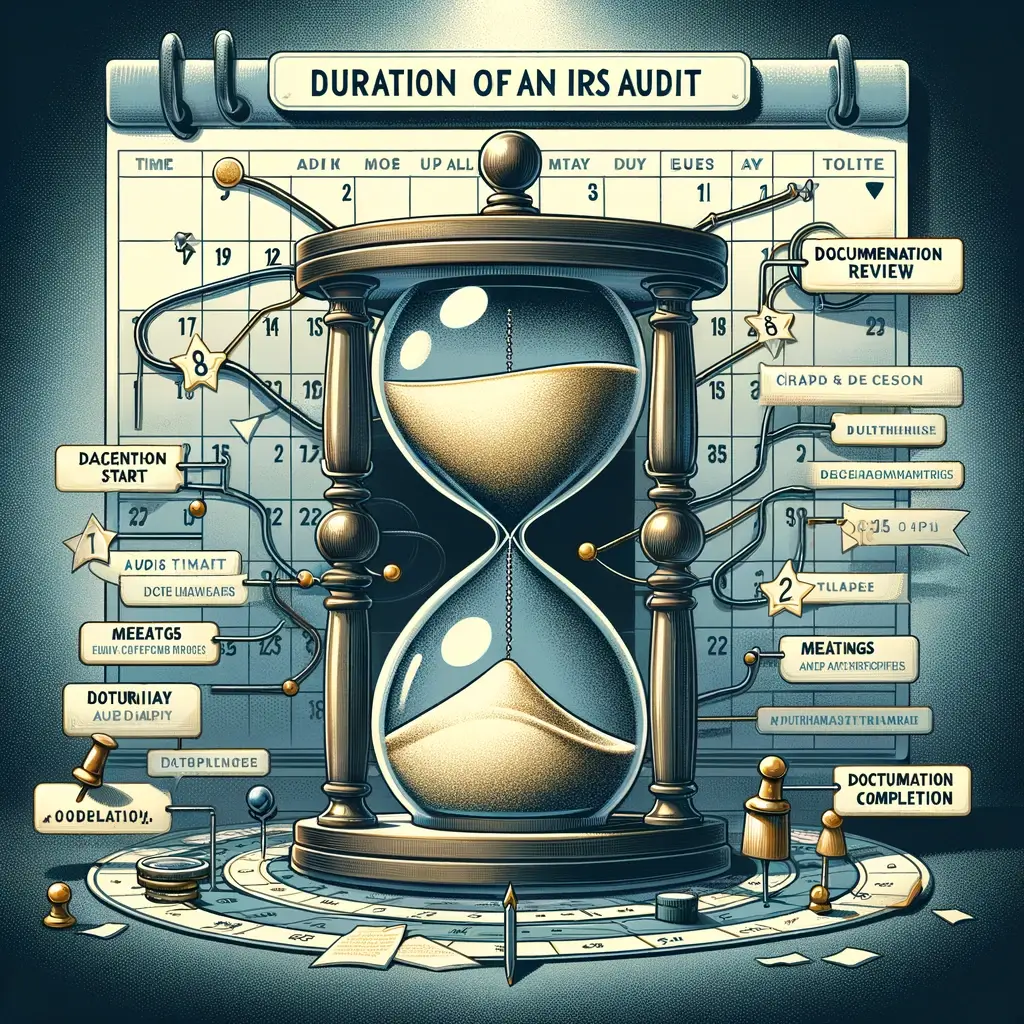In today’s complex tax landscape, individuals and businesses must understand and prepare for an IRS audit. While receiving an audit notice from the Internal Revenue Service (IRS) can be daunting, having a solid plan can help ease the process and ensure a successful outcome. In this blog, we will guide you through the steps to effectively prepare for an IRS audit and provide important information on what to do if you face one. From understanding the purpose and scope of an audit to navigating the audit process, we will equip you with the knowledge and tools you need to handle an IRS audit confidently. So, let’s dive in and learn how to tackle an IRS audit head-on.
Understanding an IRS Audit
An IRS audit examines an individual’s or business’s tax return to determine its accuracy and compliance with the tax laws. An audit ensures taxpayers have reported their income correctly, claimed eligible deductions, and followed all applicable tax laws. There are different types of audits, including field, office, and correspondence audits, each varying in complexity and interaction with the IRS.
The Purpose and Scope of IRS Audit
Being informed about the purpose of an IRS audit aids in preparation. The primary purpose of an audit is to verify the accuracy of the information reported on a tax return. The IRS conducts audits to ensure compliance with tax laws, identify instances of underreporting of income, detect fraudulent activities, and maintain the tax system’s integrity.
Understanding the type of audit scope helps in managing an IRS audit process. Field audits involve an IRS agent visiting the taxpayer’s home or business premises to conduct an examination. This type of audit is typically reserved for more complex tax returns, such as those with business income or deductible expenses.
On the other hand, office audits require the taxpayer to visit an IRS office for an examination. These audits are often conducted for individual tax returns, focusing on specific issues or deductions claimed.
Correspondence audits are the most common and are conducted through mail correspondence. The IRS requests additional information or clarification on specific items reported on the tax return.
By understanding the purpose and scope of each type of audit, taxpayers can better prepare for an audit and ensure compliance with IRS requirements. Gathering and organizing all relevant documents and records supporting the tax return information is crucial.
Common Triggers for IRS Audits
Avoiding common triggers for audits requires awareness of red flags and similar return triggers. Preparation for business record audits involves understanding common triggers, such as home office red flags and credit card red flags. Familiarizing yourself with these red flags is crucial to prevent triggering an examination report from the Internal Revenue Service. Seeking professional assistance is a good idea if you have concerns about a common type of audit. Also, maintaining good record-keeping habits can help avoid potential future pitfalls.
How to Effectively Prepare for an IRS Audit
Reviewing Financial Records: Before an IRS audit, it’s crucial to organize and review financial records to ensure accuracy and completeness. Understanding the Audit Process: Familiarize yourself with the audit process to know what to expect and prepare the necessary documentation. Seeking Professional Assistance: Consult a tax professional or tax attorney like Tax Help Attorneys for a free consultation for guidance and representation during the audit.
Organizing and Reviewing Financial Records
Understanding and organizing your original financial records is essential for effective record review. It’s crucial to have a comprehensive grasp of the entire year’s financial records to prepare for an audit. Being well-informed about the requested records dramatically assists in the review process. Familiarizing yourself with the various reasons for requested record review is essential. Additionally, implementing good record-keeping habits significantly aids in organizing your financial records, making it easier to navigate an examination report.
Understanding the Audit Process
An IRS audit can come in various forms, such as field, office, or correspondence audits. It involves a thorough examination of financial information and specific documents. Understanding tax laws, record types, and due dates is crucial for preparation. Familiarity with red flags, audit findings, and the statute of limitations is essential. Additionally, being informed about the audit results and payment options is imperative in coping with an audit.
Seeking Professional Assistance
During an audit, seeking professional assistance is essential. Licensed tax professionals offer expert help. They assist with underreported income, tax return preparation, charitable contributions, and business taxes. Professional help is crucial in communication with IRS examiners and understanding audit requests. It’s the best way to handle an IRS audit. Leveraging professional expertise can streamline the process, ensuring you’re well-prepared and informed. Their support can significantly impact everything from examining reports to engaging with IRS auditors. Seeking their guidance is a good idea to navigate this common type of audit effectively. You can get a free consultation with us to see your options.

Navigating the Audit Process
Understanding the process of an IRS audit starts with setting clear expectations. As a taxpayer, knowing your rights and what to expect during the examination report is essential. In case of any discrepancies or uncertainties, communicating with the Internal Revenue Service or seeking professional assistance can provide clarity and guidance. Keeping organized financial records can also streamline the process and make it easier to present information when the IRS auditor requests, making the overall experience less daunting. Making sure you have a good idea of the standard type of audit being conducted can also help you prepare effectively.
Expectations During an Audit
Acknowledging the importance of understanding audit expectations is crucial for adequate preparation. Tailoring responses based on the type of audit can significantly impact the outcome. Aligning the presentation of documents with audit expectations is essential for a smooth process. Mitigating risks associated with audit findings by being aware of red flags is advisable. Consulting a tax professional can clarify audit expectations and mitigate potential issues.
Your Rights as a Taxpayer
Understanding your rights as a taxpayer empowers you throughout the audit process, fostering a smoother experience. Protecting these rights is fundamental during an IRS audit and can help navigate the process confidently. Seeking professional help is a good way to ensure your rights are upheld and respected. Familiarity with taxpayer rights can make the examination report process less daunting and enable you to communicate effectively with the Internal Revenue Service.
Communication with the IRS
During an audit, effective communication with the Internal Revenue Service is crucial. Open and transparent communication aids the process, and seeking professional help from a law firm like Tax Help Attorneys can facilitate constructive correspondence. Timely responses to IRS requests are essential for maintaining effective communication. Engaging with an enrolled agent is a good idea as it can streamline IRS correspondence. Maintaining a good relationship during an examination report is vital for a smooth process.
Post-Audit Actions and Responsibilities
Analyzing the audit results is essential to understand the findings and determine discrepancies. Responding to audit outcomes promptly and accurately is crucial for compliance. Managing post-audit tax liabilities requires careful consideration and action to avoid penalties or legal consequences.
Analyzing the Audit Results
After the IRS audit, it’s crucial to carefully analyze the examination report to make informed post-audit decisions and manage tax liabilities. Understanding the findings and seeking professional assistance can facilitate the analysis. Accurate income reporting is fundamental, and consulting a tax professional is a good idea for interpreting audit results. This analysis helps prepare responses and manage any tax liabilities uncovered during the standard type of audit conducted by the Internal Revenue Service (IRS).
Responding to Audit Outcomes
Strategically addressing audit findings can mitigate post-audit challenges, supporting adequate tax liabilities management. Consulting with a tax professional is crucial for a well-informed response strategy guiding the analysis of audit results. Promptly responding to audit outcomes aligns with accurate income reporting, lessening post-audit challenges and supporting effective response strategies.
Managing Post-Audit Tax Liabilities
After an audit, it’s crucial to manage tax liabilities carefully. Responsible post-audit tax liability management is supported by strategic tax planning. Seeking professional help can facilitate effective tax liability management. Understanding the IRS collection process is essential for managing tax liabilities. Accurate income reporting is aligned with handling post-audit tax liabilities.
Tips for Avoiding Future IRS Audits
Accurate income reporting, reasonable deductions and claims, and maintaining good record-keeping habits are essential for avoiding future IRS audits. It’s a good idea to keep all necessary documents such as examination reports and similar forms organized and updated. Ensuring transparency in financial details can help build a secure case in the event of an IRS auditor’s phone call. By staying proactive in managing bank accounts and finances, individuals can minimize the likelihood of attracting the attention of the Internal Revenue Service.
Accurate Income Reporting
Fundamental for tax compliance and audit avoidance, accurate income reporting hinges on a comprehensive understanding of tax laws. Seeking professional assistance can facilitate accurate income reporting adherence, while maintaining thorough records is crucial. Consistent and precise income reporting serves to minimize audit risks, making it a good idea to ensure accurate income reporting in all financial dealings.
Reasonable Deductions and Claims
Proper documentation of deductions is crucial for supporting tax returns and navigating an IRS audit. Charitable contributions must be well-documented to withstand examination by the Internal Revenue Service. Accurate tracking of business expenses is essential for a successful audit outcome. Engaging an enrolled agent can help in understanding complex tax laws during an audit. Maintaining detailed records of financial information is advisable to prepare for a common type of audit. Ensuring meticulous documentation is a good idea to handle an IRS auditor’s inquiries effectively.
Maintaining Good Record-Keeping Habits
For tax preparation, maintaining good record-keeping habits is crucial. Consistently tracking financial information is essential for tax purposes and audit preparation. Properly documenting business taxes and organizing specific documents is beneficial for tax audits. These practices minimize the likelihood of an audit, making them a good idea for any taxpayer. Incorporating these habits will also help in case of an examination report from the Internal Revenue Service or communication with an IRS auditor.

The Timeframe and Consequences of IRS Audits
Understanding the response deadline is vital in an audit process, and familiarizing oneself with the audit process aids in preparing for the timeframe. Knowledge of the types of records requested is beneficial during an audit, as awareness of the collection process is essential for audit preparation. Additionally, being well-versed in audit results is crucial for managing tax obligations.
Typical Duration of IRS Audits
Understanding the duration of an IRS audit is crucial for preparing records and managing expectations. Familiarizing yourself with the examination process and the likelihood of an audit can help gauge the duration. Seeking assistance from tax professionals can expedite the audit process while being aware of payment options helps manage the audit duration effectively. Being prepared and informed about the Internal Revenue Service examination report is a good idea when navigating this common type of audit.
What are Some Unexpected Outcomes of an IRS Audit?
Unexpected outcomes of an IRS audit can include requests for additional information, understanding the findings, and planning accordingly. Being aware of underreported income and familiarizing yourself with the audit process helps manage unexpected results. Knowledge of unreported income also aids in avoiding unexpected audit outcomes.
Conclusion
In conclusion, preparing for an IRS audit is crucial to ensure a smooth and stress-free process. By organizing and reviewing your financial records, understanding the audit process, and seeking professional assistance when needed, you can navigate the audit with confidence. During the audit, it is vital to manage your expectations, know your rights as a taxpayer, and maintain open and effective communication with the IRS. After the audit, analyze the results, respond appropriately to any outcomes, and manage any post-audit tax liabilities. To avoid future audits, focus on accurate income reporting, reasonable deductions and claims, and maintaining good record-keeping habits. Remember, being prepared and proactive is key when it comes to IRS audits.



